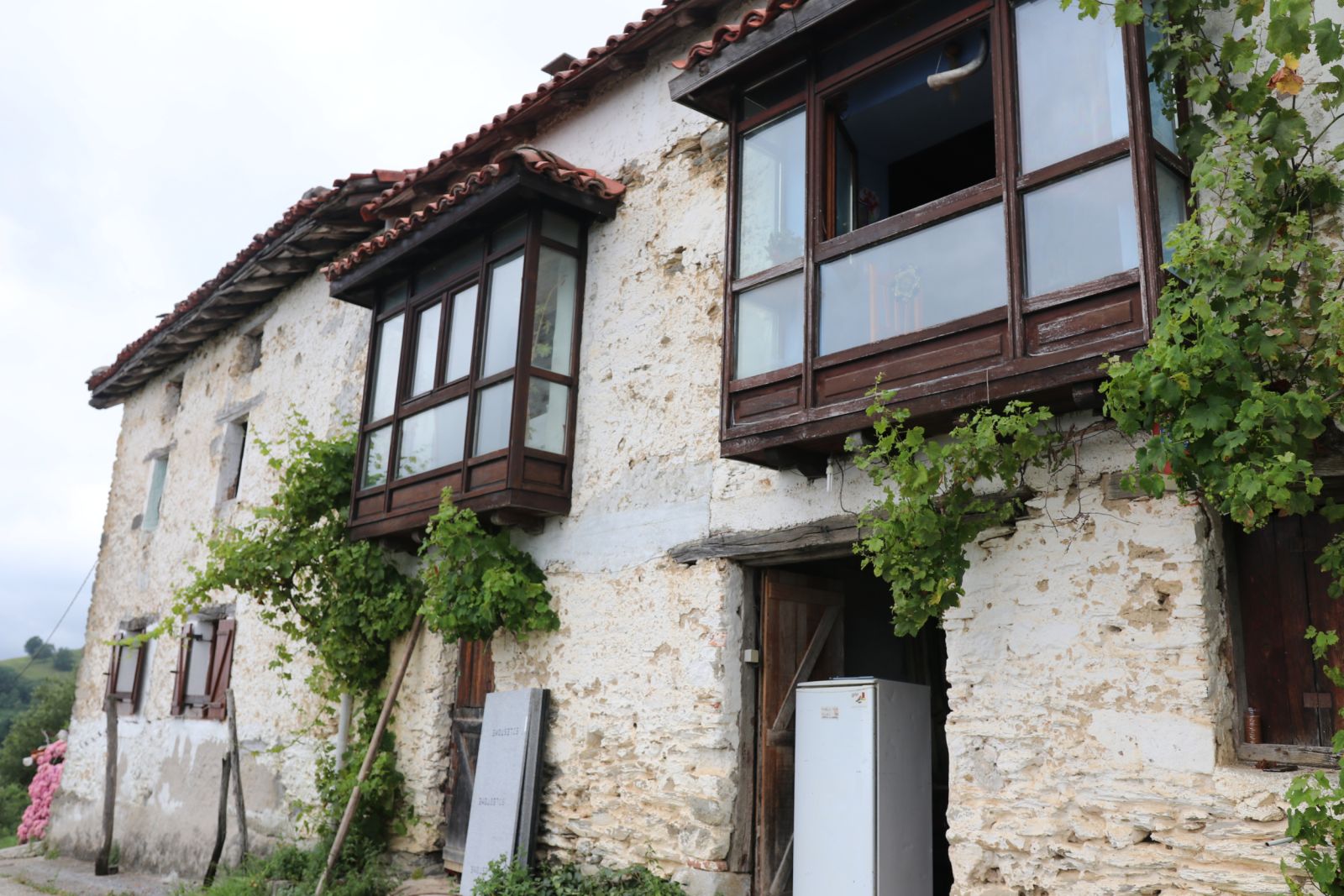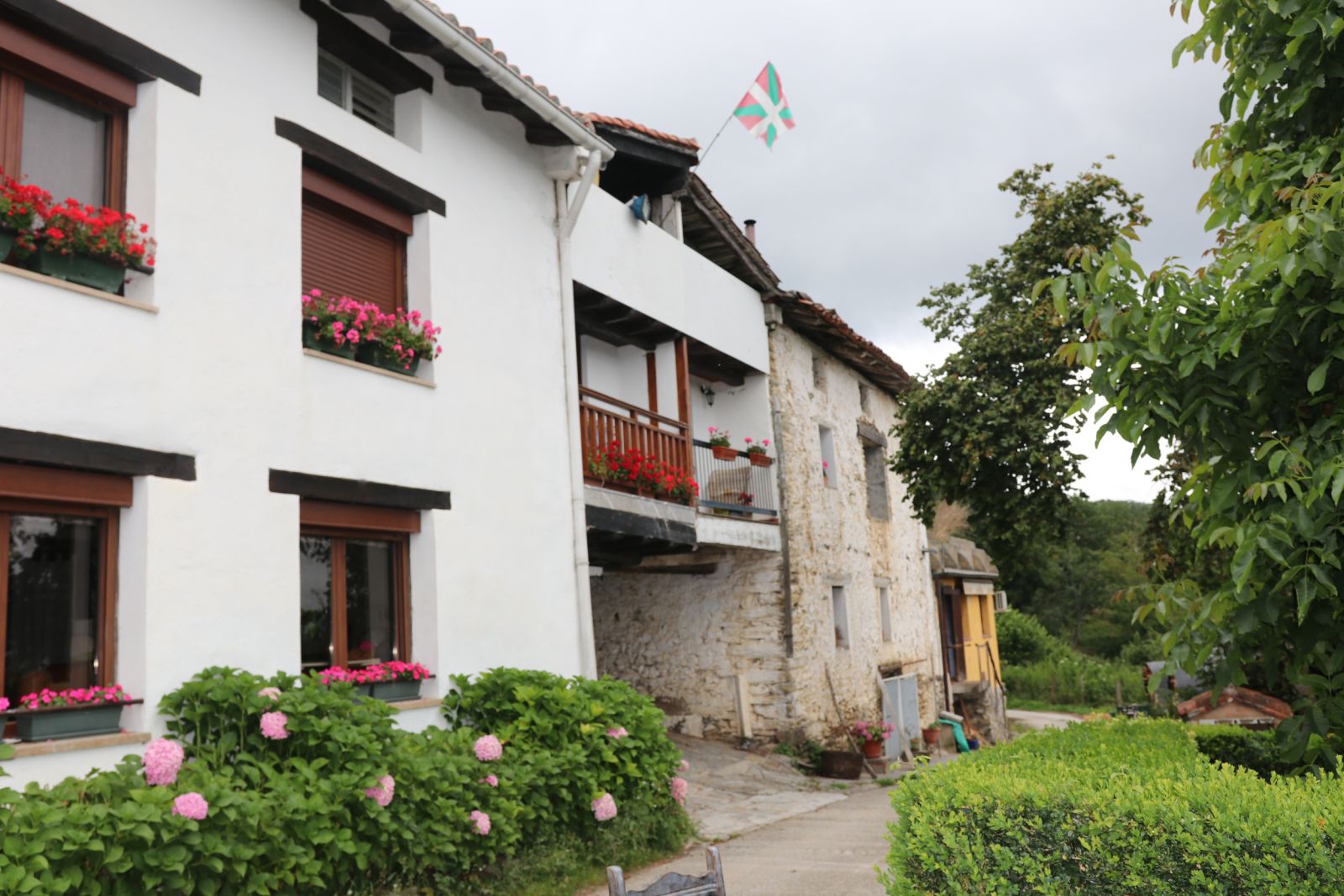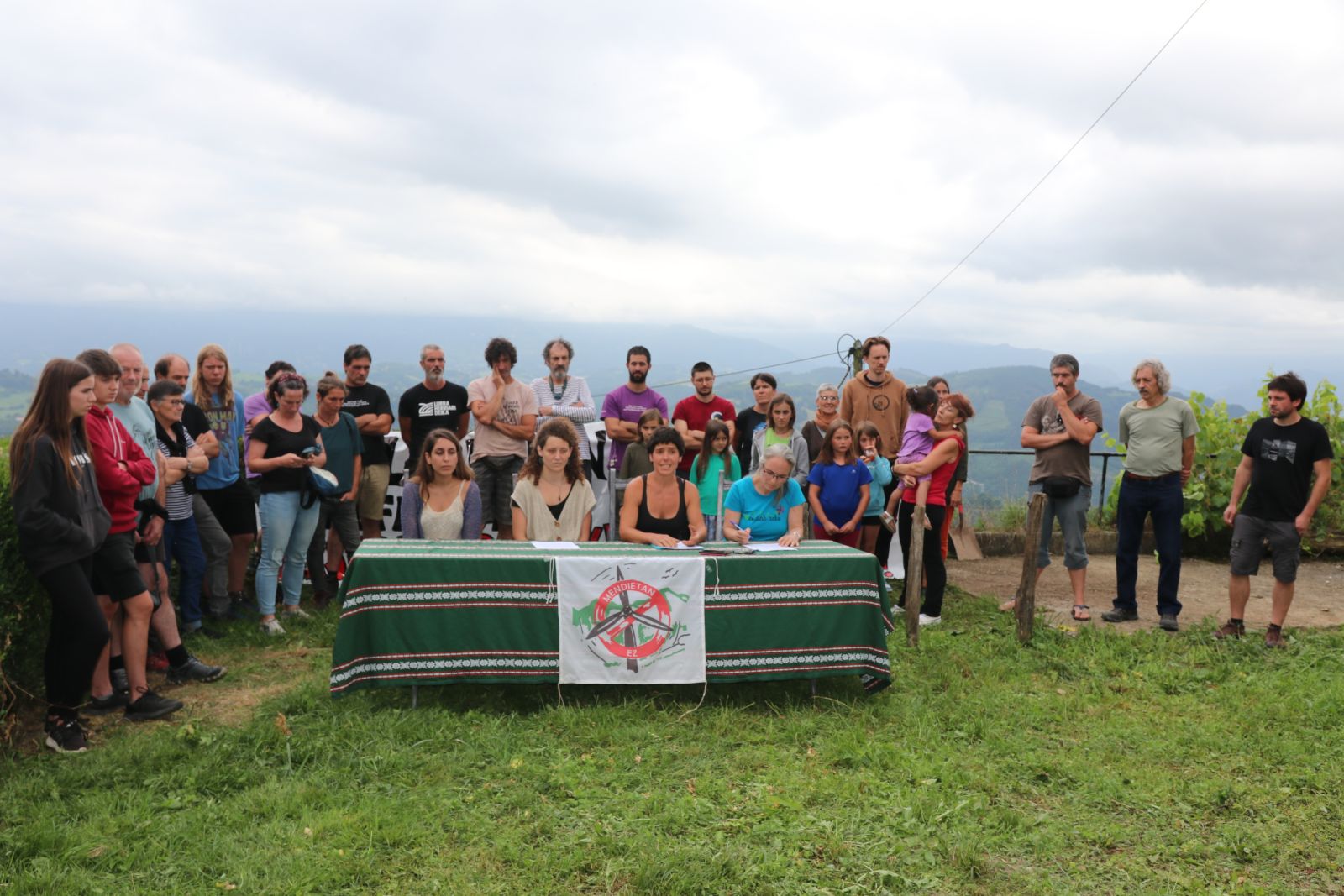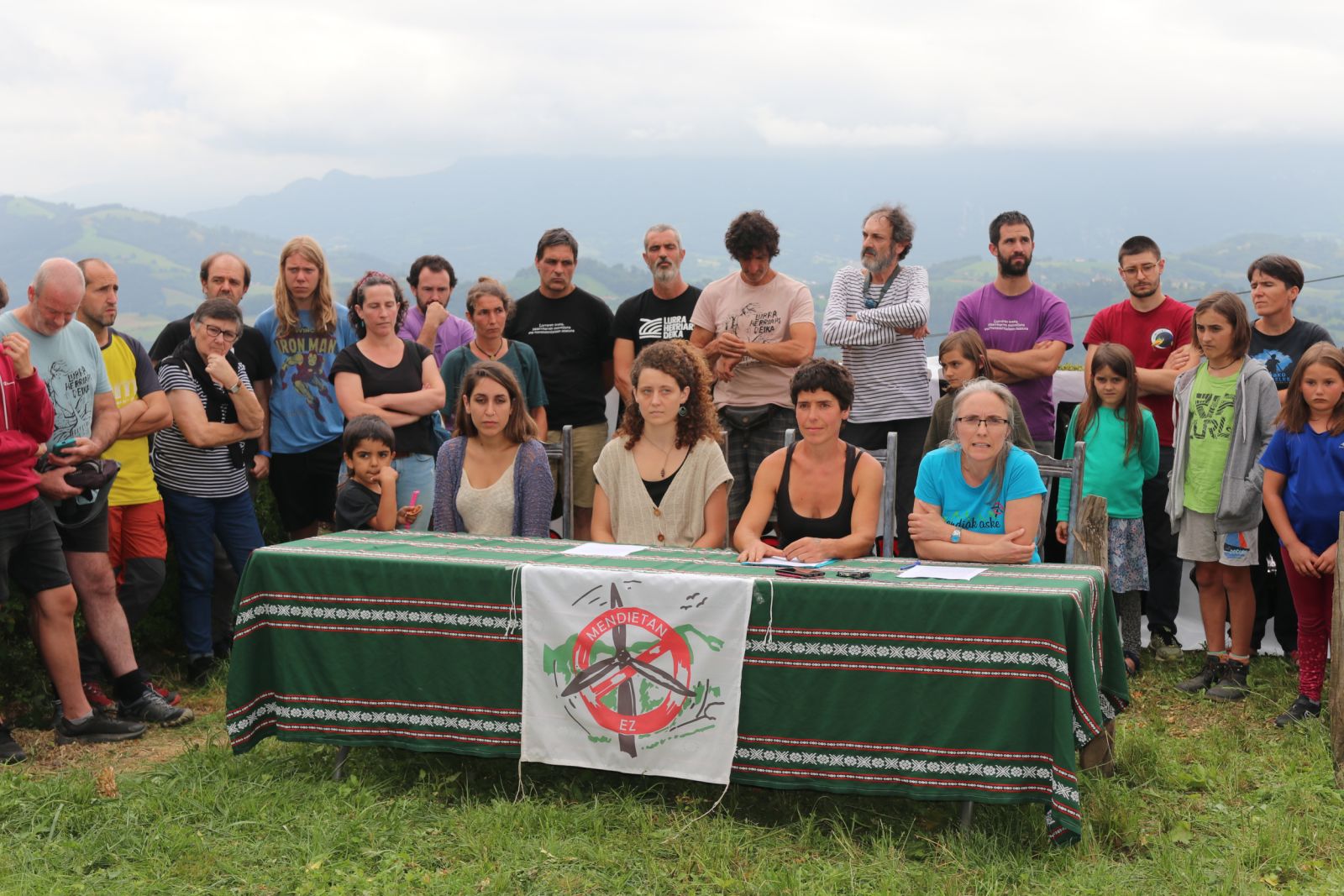"The future of the baserritars is unsustainable because they want to reserve land for energy projects"
- On the 19th of July, the labourers of 10 collectives gathered in the neighborhood of Alaba de Tolosa, under the altar "El caserío en defensa de la Amalur". A critical reading of the CAPV's Sectoral Territorial Plan for Renewable Energy has been carried out in the last days of the period of allegations and it has been noted that in the coming decades the fertile soil will be essential to ensure food: "By the end of this decade, 60% of the baserritars in the Basque Country are expected to retire. Who wants to deal with the threat of renewables? In addition, with the shortage of oil, food from outside will just be brought in. We inevitably need more baserritars and to protect the land that remains for us. We can't lose a single hectare." This concentration against the industrialization of agricultural land has been carried out in solidarity at the Alaba Zar village, where the project is being replaced, but where the Government plans to set up a 12-hectare photovoltaic plant.

In the dwelling Alaba Zar, baserritarras belonging to the following groups have joined: Wood and sail Peasant action in EH, Biolur, Bionekazaritza, EHNE Gipuzkoa, UAGA, EHNE Bizkaia, Etxalde, Landarlan and Naturko.
The CAPV Sectoral Territorial Plan for Renewable Energies provides for the implementation of renewable energy projects on fertile forests and soils (hereinafter, we will summarize the PERI with the acronym PTS), and explain the threat situation of the baserritars living in these fields: "The baserritars here have also begun to feel the breath of energy capitalism on the back of the neck." Since the US PTS became public on May 10, 2023, they have explained that the document has "often been hailed": "On the maps I didn't know if orchards or grasses were ours; sometimes the image was too diffuse, other times tears decided to protect the heart."
"We'll lose about 13,700 hectares of fertile land."
They denounce that the government has been "changing" the amount of energy it targets: "We have learned that since 2016 there was the Euskadi Energy Strategy by 2030, and that the goal set was to install 1,440MW in the hope of producing 3,454GWh. We've learned that numbers are variable. The US PTS Progress document provided for the installation of 6,480MW by 2030, with a production expectation of 11,599GWh. That is, three times what appeared in the Energy Strategy. In the Initial Strategic Document, the production of 10.338GWh. However, in several sections of the PTS they leave the doors open to increased energy production."
Farmers claim that the PTS's objective is not to meet the needs of citizens, but that private companies "do business": "This is what the PTS says: the objective is to pour the energy generated into the electricity transmission or distribution network and not linked to self-consumption. The only conclusion that can be drawn is that the people and the land want these private developers to continue doing business: installing power plants here and transporting energy remotely." Consequently, they warn that the garrisons living in it are inhabitants and workers of the rural environment, have an "unimaginable future": "The PTS questions agricultural or livestock projects already underway, as it is intended to reserve the land it currently uses to install energy projects. We've taken the math out and it's about 13,700 hectares."
What will we eat in the future?
They warn of the risk of "glare with energy consumption": "Meanwhile, in the midst of the eco-social crisis, there is no thought of what we will eat here in the future. We do not know how the strategy, land and peasants will be carried out at the CAPV from the European Community Bureau if we continue with industrialization. By the end of this decade, 60% of the baserritars in the Basque Country are expected to retire. In addition, with the shortage of oil, food from outside will just be brought in. For there to be a future we will have to rely on local agro-ecological production and move to short-term consumption".
They explain that in the future "inevitably" we will need more baserritarras: "We must take care of the existing ones and open paths to the new ones so that they will then choose us. And protecting the remaining lands, if not, we have done so. We cannot lose a single hectare. Now (also) we have to defend the land."


A tough blow to the Alaba Zar project and the Isastegi sidreria
They explain why Alaba Zarren met: "The situation here today will pass tomorrow to many other baserritars."
Alaba Zar is a row of inhabited farmhouses that currently house between 15 and 20 people. Since time immemorial, goat cheese and bread have been produced in an ecological way, of which many citizens will know from the fair of Tolosa and Ordizia. Now two young families take over to make organic bread and cheese. Two years ago a family came to another life to work on the bee project, edible forest and orchard.
The Basque Government plans to set up a 3-4 hectares photovoltaic plant on the wheat transplantation site to produce bread and in the goat grazing area. The PTS provides for a photovoltaic power station of between 7 and 8 hectares on the grounds of the pilot project of the Isastegi plant for the implementation of an ecological apple tree. In both cases, these solar plants threaten the future of the projects that have given rise: "These are the best lands we have here," they say.
Members of Alaba Zar stressed that this is a living community in which biodiversity is very valuable: 20 endangered birds and breeders according to catalogues and directives of the CAPV, Spain and Europe. They add that this government is not doing in a transparent way: That this PTS has been made public in the context of the municipal election campaign and that the process of setting up new municipalities has made it possible to make representations. And that, in addition to all this, the members of Alaba Zar have not received any information about the intention to build a power station on their land.
The declaration of the baserritars of 10 associations can be read in full in:
Energy and housing crisis
Uncertainty has become a travel companion, in shadow. Their presence is supported by many factors, and those who were old – the scarcity of land, the lack of relay… – have been given new ghosts, not so new, the climate change and the energy colonialism that advances us. They are the two sides of the same coin: the capitalist system.
Unlimited growth is impossible, and yet, as if it did not exist, capital wants to apply the same recipe. And those who have destroyed the planet will be enriched, besides the first.
In Hego Euskal Herria we live closer to the distress of farmers from the countries of the South. With the differences that each context sets, the baserritars here have also begun to feel the breath of energy capitalism on the back of the neck and some of us have begun to remove dust from the bags.
Plundering agricultural land is not new. Industrialization. Then the building bubble. Big infrastructure was also looking for land that was able to create food. Disguised, some people's hunger for money and speculation have always been present. This progressive expropriation has led us to the baserritars to more difficult areas, to land that nobody wanted. We have become accustomed to living in isolation or surrounded by industrial polygons. This development model has rightly shown us that we have no place in this modern society, if not to give a few colors splashed to the gray of the city.
The next wave is on top: the energy transition. Over the centuries, although baserritarras have resisted it, today it is difficult to resist, because we do not know how to surf in those waves, but we also have a lot of work in seafood. We are used to living in corners, with fewer public services and to adjusting household costs to the prices of our products; auzolan is an essential network to maintain our lives. And now?
Since the CAPV’s Sectoral Territorial Renewable Energy Plan (PTS OF RENEWABLE ENERGIES) became public on 10 May 2023, the document has been reproduced frequently. On the maps I didn't know if the orchards or pastures were ours; sometimes the image was too diffuse, other times the tears decided to protect the heart.
Since May, in addition to the work of the dwarf, together with the neighbours of the groups that have been created, we began to make allegations to the PTS, as humble citizens can deal with. Despite being a hurried road, we have learned a lot. We have learned that since 2016 there was the Euskadi Energy Strategy by 2030 and that the objective set was to install 1,440MW in the hope of producing 3,454GWh. We've learned that numbers are variable. The US PTS Progress document provided for the installation of 6,480MW by 2030, with a production expectation of 11,599GWh. That is, three times what appeared in the Energy Strategy. In the Initial Strategic Document, the production of 10.338GWh. However, in several sections of the PTS they leave the doors open to increased energy production.
We have learned that the US PTS aims to declare sites for large-scale wind and photovoltaic power plants (30MW or more). In terms of size, it takes into account the installations of five or more wind turbines, one to five hectares per wind turbine, with access included. For photovoltaic plants, land of 10 or more hectares in Álava and plots of 5 or more hectares in Gipuzkoa and Bizkaia. The PTS also allocates areas for the installation of plants over 50MW, although Madrid takes care of them. Installations of less than 30 MW are excluded from planning.
In total, we will have power plants of all sizes: big, big and giant. The US PTS document read, among others: “The aim is to reduce the current uncertainties of promoters and to increase legal certainty to awaken the interest of private initiative.” “The defined sites are destined for the installation of electric power generation, with the objective of pouring the energy generated in the electricity transmission or distribution network and not associated with self-consumption”.
The only conclusion that can be drawn is that the people and the land want these private developers to continue to do business: installing power plants here and transporting energy remotely. It's planning for them. The PTS notes the rural area: “Renewable energy is an important economic engine that contributes to the settlement of the population and to the building of the territory.” Has the author read more than publishing reports from companies interested in the energy bubble?
The future that opens up in front of the baserritars, and the inhabitants of rural areas, is absolutely black. It questions the agricultural or livestock projects already under way, since the PTS aims to reserve the land it currently uses for the installation of energy projects, approximately 13,700 hectares. What degree of security can anyone who wants to enter the process of handing over a dwelling, or what they are doing? How are they going to buy the land, despite everything, young people who want to install it know that electricity companies are going to promise them more money?
And meanwhile, obsessed with energy consumption, in the midst of the eco-social crisis, is not thinking about what we will eat here in the future. To carry out the European strategy “From farm to table” land and peasants are missing if peasant lands continue to be industrialized. At the end of this decade, it appears that 60% of the baserritars in the Basque Country are expected to retire. In addition, with the shortage of oil, food from outside will just be brought in. In order for there to be a future we will have to rely on local agro-ecological production and switch to short-term consumption.
This inevitably means that we need more farmers, who take care of those who are and open roads to the new ones, so that they can then choose us. And protecting the remaining lands, if not, we have done so. We cannot lose a single hectare.
Now (also) we have to defend the land.
Signatories: Wood and sail Peasant Action, EHKo, Biolur, Bionekazaritza, EHNE Gipuzkoa, UAGA, EHNE Bizkaia, Etxalde, Landarlan, Naturko.
On 19 March, in the Alondero room in Zestoa, we had an interesting round table on the energy transition organized by the community and renewable energy cooperative Argiola.
The round table was entitled “Energy transition, how?” and for this purpose the organizers invited... [+]














